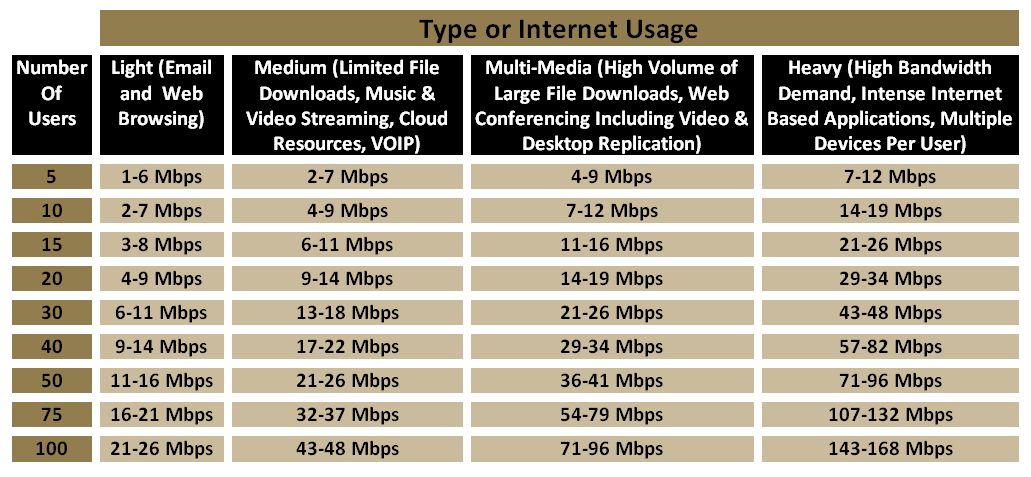
What Internet speed do I need for my business? This can be difficult to determine. Not every business requires the same amount of speed. The amount you need will be determined by several factors including the number of users you have and the type of activity done over the Internet. The range can be quite wide and you don’t want to have insufficient speeds, nor do you want to be paying for extra bandwidth that you really don’t need. In this post, we will explain what Internet speed and bandwidth is along with helping you to determine how much your particular business should need. If you are looking for advice on the best Internet plan for your particular needs, contact Network Telecom. We can take a look at your current plan, show you where you may be paying to much, and help you negotiate the best plan for you.
“We have been working with Network Telecom for a number of years now. We are a growing company so changes are always happening. Their team is very helpful to recommend the best solutions for our required needs. Always complete the job in the scheduled time. They are the company that we call when we need professionals. I would highly recommend this exceptional team.”
– Suzanne Bolton Hull
Read more Google Testimonies of our Work
What Internet Speed Do I Need For My Business?
This is a very important question to answer and it can be challenging to get the correct balance. You don’t want to overspend and pay for extra speed and bandwidth that you really don’t need, nor do you want to function ineffectively because of insufficient speeds. Getting the right balance is necessary.
Every business is different, but almost all businesses today require Internet service for some, all, or any combination of the following services:
- online research
- VOIP communications
- customer interaction (social media, forums, contact forms)
- Cloud Services
- e-commerce
- e-fax

How Are Internet Speeds Measured?
Internet speeds are measured in megabits per second (Mbps). A bit is equal to 1/8 of a Byte, so 1 megabit is equal to 1/8 MB (megabyte) according to ciinc.com. Therefore, if you have a connection speed of 1Mbps then this means that it will take about 8 seconds for a 1 MB file to download to your computer or upload to the Internet. If you would like to know what Internet speed you are actually getting, you can test it here. If your Internet speeds seem to be slower than what you are normally getting, click here to try the troubleshooting tips provided by PCmag.com.
What Is The Difference Between Speed And Bandwidth?
Internet speed and bandwidth are closely related but they are not the same thing. A great analogy from learningnetwork.cisco.com will help illustrate the difference. Think of water flowing through a tap. If you can fill a bucket with water in 5 minutes then you can fill 12 buckets in an hour. So the speed of tap is 12 buckets per hour. If you double the width of the tap then you can fill 24 buckets in an hour. In this example, the speed of the water hasn’t increased, however, the size of the tap has. More water was transferred, but the speed remained constant. Internet speed is like the rate that the water is flowing and bandwidth is like the width of the tap. If you increase your bandwidth, you can have more data transfer at the same speed.

Download vs. Upload Speeds
Usually, your Internet Service Provider will offer you two different speeds – one for downloads and another for uploads. They might describe their speeds as follows:
“up to 5/1Mbps”
The first number refers to the download speed (5Mbps) and the second to upload speeds (1Mbps). To put that into perspective, at that speed you should be able to download a 25 megabyte PowerPoint presentation in about 40 seconds, or you could upload the same presentation in a little more than 3 minutes. (Remember we said earlier that a megabit was 1/8 of a megabyte).
Bandwidth Required Per User
The following chart will give you an idea about the amount of bandwidth you would require depending on the number of users that you have and the type of Internet usage your staff normally requires. The data comes from Bandwidthpool.com.

According to the above chart, if your business has 10 users who do limited file downloads, stream music and videos, and use resources on the cloud and VOIP phone services, then you would require 4 to 9 Mbps of Bandwidth. On the other hand, if you have 100 users who are utilizing multi-media such as web conferencing, which has video and desktop replication, as well as doing a high volume of larger file downloads, then you would need between 71 and 96 Mbps.
Best Bandwidth Per User Calculator
If you would like to find out the best bandwidth for the exact number of users that you have in your business, the following free online calculator is a great resource. Simply click here to access the calculator.
What Is Bandwidth Throttling?
Bandwidth throttling refers to the intentional slowing down of your Internet speed. This is done by limiting the bandwidth available. Some businesses choose to limit the amount of bandwidth their employees can use, thus limiting network congestion. Throttling will put a cap on speeds so that people can’t stream or download big files for extended periods of time and slowing down Internet speeds for other members of their team.
When Should I Make a Change?
If your Internet speeds are impeding your business’s productivity it might be a good time to consider increasing your package or changing your service provider. If you are considering moving some or all of your processes to the cloud, you may require more speed or bandwidth, especially if you are going to be using VOIP for your phone systems.

Why Choose Network Telecom?
Network Telecom offers consulting and advice on Internet and telecommunication services. What exactly does that mean? We will work with you to determine ways to minimize the cost and maximize the features of your current telephone, fax, mobile, and internet services. In addition, we can help you determine which services are right for your business’s unique needs. Contact us and we can set up a time to discuss how you can get more out of your current services, or, if you are considering switching from your current ISP, we will help you find the best service package available.
Sources:


